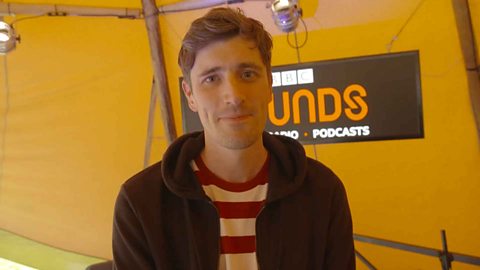Meet Liam and find out about his life as a digital content producer at Skiddle. Part of our Bitesize world of work series.
Liam Gharib Eshghi - Digital content producer
So my job mainly is video production, video producing, camera operating, but it also might be creating graphics, it could be recording a podcast and working with audio or it could be little bits of animation. It's generally just promoting promotional materials for live events and also promoting Skiddle themselves.
My career path actually started out back when I was at college. So I left school and joined at Blackburn college and I went on to do music technology and audio production there. From that, I went and joined Blackburn University and I studied Film. Obviously, I picked up so many something skills when I was there like how to use a cameras, editing software and things like that.
From there, I left and got an internship at a local marketing agency in Ribchester. I was like their first in house video guy. There was a little bit of winging it involved in that stage as well, it was all just get the jobs done and learn skills as I was going. From there I got offered a job at The Gate Films in Manchester and they’re a TV production company. So that was amazing for me because it really stepped the level up; I went from producing video in a smaller agency to producing things for like Audi, Jaguar, you know really big clients. And then I went freelancing for a while. Sort of a natural progression, sort of meeting clients and things like that. That was an amazing experience because obviously I learnt so much more on the other side of video, which isn't just making them, it's actually being a producer, the researcher. You know, doing all that side as well.
And then I actually met Rich and he brought me into Skiddle and said I like what you’re doing. We'd love to take you on board here and it just became a dream come true for me because I grew up listening to music, playing in bands and you know loving going to gigs and now people pay me to do it, so it's a dream come true.
I would say the skills required to do my job, definitely a lot of creativity, definitely a lot of enthusiasm and energy because as you can imagine running around to live events it's often busy, noisy, quite chaotic situations, so you need to be able to handle that more as a personal skill, and really keeping up to date with all the current trends that go on as well because it’s always moving forward. So I always try and keep my finger on the pulse, and like the latest trends, and how people are producing and things like that.
The biggest obstacle for me has been just keeping at it, keeping the belief that that dream job will come out of it because a lot of people start off in a career like this, with dreams of maybe working in music videos or going shooting big films and then they actually find that they earn the money shooting corporate videos for dentists or accountants or things like that. All that is happening for a reason, it does all count, the skills you are picking up there will come into play later down the line. Keep positive about what you're doing and if you love it, put your all into it.
I grew up listening to music, playing in bands and loving going to gigs. Now people pay me to do it, so it's a dream come true.
- Liam’s role is to promote his company and live events through online content. He uses a lot of technical skills in his job – like audio and video production, camera operating and animation
- At college Liam studied Music Technology and Audio Production, before studying Film at university. He then got an internship at a local marketing agency, making in-house videos, before moving to a TV production company to produce videos for high profile brands
- Liam also freelanced for a while – which helped him learn more about researching and producing videos – before getting his current job
- Liam says you need a lot of creativity, enthusiasm and energy for this kind of role – especially when you’re working at busy live events. It’s also important to keep up with current trends.

Liam is a digital content producer. A similar role to a digital content producer is a web content editor. Web content editors research, write and manage an organisation’s online content, including text, images, video and other media.
What to expect if you want to be a web content editor
- Web content editor average salary: £22,000 to £40,000 per year
- Web content editor typical working hours: 35 to 40 hours per week
What qualifications do you need to be a web content editor?
You could get into this role via a university course, a college course, an apprenticeship or working towards the role.
Sources: LMI for All, National Careers Service
This information is a guide and is constantly changing. Please check the National Careers Service website for the latest information and all the qualifications needed.
For careers advice in all parts of the UK visit: National Careers Service (England), nidirect (Northern Ireland), My World of Work (Scotland) and Careers Wales (Wales).


Find out more
Work experience in your area
Find work experience placements with Workfinder.
Tips and advice
Help with interviews, writing a CV and all things work experience related.


Phillip: radio producer video
Phillip produces BBC Radio 6 Music's afternoon show with Shaun Keaveny.

Careers A to Z: Find your perfect job
From actor to zoologist, find the right fit for you.

Riyadh: presenter and YouTuber. video
Riyadh Khalaf is a producer, presenter and content creator, amongst other things.
